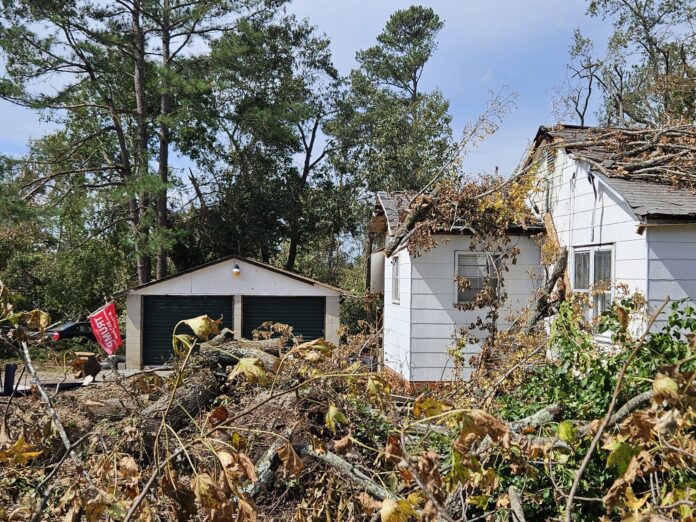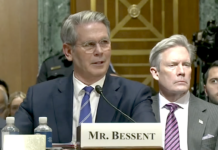
WASHINGTON (States Newsroom) — The Biden administration is asking Congress to approve $98.4 billion in emergency spending to bolster the federal government’s response and recovery efforts following a series of natural disasters, including Hurricanes Helene and Milton that devastated parts of Southeastern states.
The Federal Emergency Management Agency and Department of Agriculture would receive the bulk of the funding request, if lawmakers approve it in full, though they can increase, decrease, or ignore whatever they wish.
Congress is expected to begin vetting the supplemental spending request this week before departing on a one-week Thanksgiving break. It’s likely lawmakers and staff will release an emergency spending bill in early December when both chambers return for a three-week session.
“It is absolutely critical that these communities know that their government has not forgotten them,” White House budget director Shalanda Young said Monday in a briefing with reporters.
The spending request, she said, would address a series of natural disasters throughout the country, including ongoing recovery efforts following the wildfires in Maui; tornados across the Midwest; the collapse of the Francis Scott Key Bridge in Baltimore, Maryland; and severe storms in Alaska, Connecticut, Illinois, Louisiana, New Mexico, Pennsylvania and Virginia.
Alabama, Florida, Georgia, North Carolina, South Carolina, Tennessee, and Virginia were hit by the hurricanes.
Busy hurricane, tornado seasons
FEMA Administrator Deanne Criswell said during the call that 2024 has been “a year of records.”
“Hurricane Beryl became the earliest Category 5 storm to form in the Atlantic and Hurricane Helene has devastated six states,” Criswell said. “We saw the second-busiest spring tornado season ever recorded. And we’ve seen, overall, a 50% increase in disaster activity.”
FEMA managed 114 disaster declarations during 2023, but has provided response and recovery aid to 172 natural disasters so far this year, Criswell said.
“To date, FEMA has obligated over $7.5 billion alone for the response and recovery for Hurricanes Helene and Milton,” she said. “These storms were incredibly large and spending on the first month, post-landfall for each storm outpaced nearly all disasters that we have responded to over the last 20 years.”
FEMA, she said, has enough funding to continue its life-saving response and recovery activities through the end of a stopgap funding bill on Dec. 20, assuming no other major disasters take place.
The emergency spending request released Monday asks Congress to provide
-
$40 billion for the Federal Emergency Management Agency’s disaster relief fund.
-
$24 billion for the Department of Agriculture to “provide assistance to farmers that experienced crop or livestock losses due to natural disasters like hurricanes, drought and wildfires.” That funding would also go toward a permanent overhaul of pay for federal wildland firefighters and emergency food support programs, like the Special Supplemental Nutrition Programs for Women, Infants and Children or WIC, according to a fact sheet.
-
$12 billion for the Department of Housing and Urban Development for Community Development Block Grant Disaster Recovery programs.
-
$8 billion for the Department of Transportation to repair roads and bridges throughout 40 states and territories that were “seriously damaged by natural disasters or catastrophic failures from external causes,” according to a fact sheet.
-
$4 billion for the Environmental Protection Agency for “long-term water system upgrades” as well as hazardous waste and debris clean up.
-
$3 billion for the Health and Human Services Department, which Young said would help “build supply chain capacity and resilience for IV fluids and other critical medical products that became scarce during recent hurricanes.”
-
$2 billion for the Small Business Administration for low-interest disaster loans.
-
$2 billion for the Commerce Department for flexible economic development grants and to buy three “hurricane hunter” aircraft.
-
$1 billion for the Education Department to aid schools in affected areas.
-
$1 billion for the Energy Department to “support grid rebuilding, modernization and future hardening efforts in areas hardest hit by Hurricanes Helene and Milton and funding to implement energy recovery efforts in communities affected by the Maui wildfires,” according to a fact sheet.
-
$500 million for the Army Corps of Engineers to reimburse the cost of cleaning up wreckage after a ship crashed into the Francis Scott Key Bridge in Baltimore, Maryland.
-
$300 million for the State Department to “address the need for additional water infrastructure to prevent and reduce sewage flows and contamination at the South Bay International Wastewater Treatment Plant” in California.
-
$200 million for the Interior Department for several programs, including a permanent overhaul of federal wildland firefighter pay, repairing siphons on the St. Mary Canal in Montana and mapping hazard impacts, according to the fact sheet.
-
$200 million for the Department of Labor’s Dislocated Worker National Reserve.
-
$100 million for the Legal Services Corporation for legal assistance for low-income disaster survivors.
-
$100 million for AmeriCorps for disaster recovery projects.
Congress to probe disaster recovery
Congressional committees are holding a series of hearings this week to delve into how the Biden administration responded to the slew of natural disasters that have happened this year and to vet the supplemental spending request.
The House Transportation and Infrastructure Committee is scheduled to hold a hearing Tuesday morning with Criswell; North Carolina Republican Rep. Chuck Edwards, who represents western sections of the state, including Asheville; and Florida Democratic Rep. Kathy Castor, who represents parts of the Tampa Bay area.
The House Oversight and Accountability Committee will hold a hearing Tuesday afternoon on FEMA’s natural disaster response, with testimony from Criswell.
On Wednesday, the Senate Appropriations Committee will hold a hearing on disaster funding needs with testimony from Georgia Democratic Sen. Jon Ossoff, North Carolina Republican Sen. Thom Tillis, Transportation Secretary Pete Buttigieg, Small Business Administrator Isabel Guzman, Deputy Secretary of Agriculture Xochitl Torres Small, Deputy Secretary for the Department of Housing and Urban Development Adrianne Todman and FEMA Administrator Criswell.
The Appropriations committees in the House and Senate will work with leadership to draft the supplemental spending bill.







